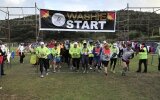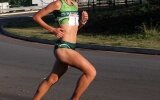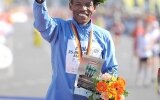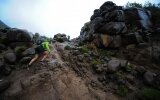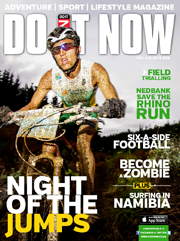- Magazine
- #readityourway
- Weekly Stories
- #shareyourstory
-
Adventure
- Abroad Travelling
- Africa Travelling
- Events
- Expos & Shows
- Festivals
- Fishing
- Free Diving
- Gliding
- Horse Riding
- Inspiring People
- Islands Travelling
- Kite/Windsurfing
- Motorbiking
- Motorised Water Sports
- Mountaineering
- Mountain Biking
- Off-road 4x4
- Off-road Motorbiking
- Paddling
- Performance Driving
- Photography
- Rock Climbing
- Rollerblading
- Sailing
- Scuba Diving
- Skateboarding
- Skydiving
- Snowboarding & Skiing
- Surfing
- Swimming
- Trail Running
- Wakeboarding
- Waveski Surfing
-
Sport
- Adventure Racing
- Fishing
- Free Diving
- Gliding
- Health & Fitness
- Horse Riding
- Inspiring People
- Kite/Windsurfing
- MMA
- Motorbiking
- Mountain Biking
- Multi-sport
- Off-road 4x4
- Off-road Motorbiking
- Paddling
- Performance Driving
- Photography
- Road Cycling
- Road Running
- Rock Climbing
- Rollerblading
- Sailing
- Scuba Diving
- Skateboarding
- Skydiving
- Snowboarding & Skiing
- Surfing
- Swimming
- Rugby
- Trail Running
- Triathlon
- Wakeboarding
- Waveski Surfing
- Lifestyle
- Calendar
Marathon Mileage
Words: Liana McCloghrie | Photos: Liana McCloghrie & Warren Goldswain / Shutterstock.com
Category:
Road Running
The Comrades Marathon has been part of my family for as long as I can remember. It started with driving down to Durban to support my grandfather while he was running. When he passed away from cancer, we continued to get up in the early hours of the morning, every year, to watch the start. We were glued to the TV screen, following the gripping moments and crying for the last-minute painful sprints of those at the end trying to beat the gun.
I always said I would run the Comrades one day in my grandfather’s footsteps and memory, and when my mother called me in 2009, just as the mayor was firing the gun for the start of that year’s race, and said, “Next year is 2010, let’s do it?” I agreed. The very next morning I started training and ran (with a fair amount of walking) around the block. Each morning after that, I kept at it and soon I was able to run for longer.
My next step was to join a running club, so I signed up with Discovery because it was near to my house and convenient for all the training sessions. My first 10 km race was nerve wracking and all I could think about was if I would finish and what my time would be. I did finish and went on to run many other races, as well as complete three Comrades Marathons.
Training
Comrades’ training is a serious commitment and lasts, if done properly, for an intensive year. Each month is spent building on distance and kilometres logged in races and training. During this time, you become terribly anti-social, especially on a Saturday as you need to focus on Sunday’s race. This entails making sure you get a good night’s rest, as well as avoiding any foods or alcoholic drinks that may upset your rhythm the next day. Early morning training sessions also require a huge amount of discipline, as you are often woken by your alarm while it is still dark outside and wonder why you are doing this to yourself.
When people hear you are running the Comrades, the first thing they ask you is if you are crazy.
The next is awe and respect for someone who can dedicate themselves to such a mammoth goal and work towards it at the expense of many hours of training, painful muscles, blisters, chafing and physio sessions.
Every single race is a milestone in the steps leading up to the Comrades and at the end of the day, finishing is all that matters and the feeling you get at the end is one you can not begin to describe to anyone else. Each race also has an effect on the next week’s training and the targets you’ve set. This is especially true for qualifying races, which are the main focus so that you place yourself in a seeding pen that will give you the best start in a race that attracts more than 18,000 entries.
Reality sets in when you look at your calendar and realise that there is only 2 weeks until the start of your ‘long run’. This is the peak of your training, where you run 60 km or more to prepare yourself both mentally and physically to endure the kind of distance that Comrades is characterised for. The idea at this point is to test out everything you will be using on race day, right down to the socks you’ll wear and the energy gels you’ll take in, so that you can make any minor changes if necessary.
Tapering is one of the most frustrating parts of training for Comrades, as you cut your distances down to almost nothing and feel like you are doing very little and worry constantly that you’ve missed something. But, as they say, you should arrive at the start in Durban, slightly overweight, slightly under trained and well rested. The last week brings the sudden realisation that the moment is almost upon you and the tension mounts as the big day draws nearer as the start gets closer. Every person you interact with constantly asks if you are ready and excited, but you don’t even know how to describe how you feel, as the whole experience still seems somewhat surreal.
What to expect
Listening to Bruce Fordyce speak at a Comrades presentation at our club, he described the 'up' run in graphic detail, especially the hills and how they were going to tax your body, and that you shouldn’t start too fast or you will hit a wall later. As he talked, I could feel the panic growing within me and I started doubting whether I’d done enough to complete this huge task that I had set myself. But then I realised there was nothing more I could do and that sheer will and determination would get me through to the end.
Pre-race preparation
On the drive down, you are always advised to drive the route so you can visualise what the race will be like and know what you are in for. This can be both terrifying and reassuring. Often you get lost on the way and eventually give up because after a long drive down, you just want to go back to your accommodation and put your feet up.
I am lucky to have had such a great support team in all the years that I’ve run. They make every effort to keep me rested and relaxed so that I am well prepared for race day. On the day, I think they do more running than I do, with my mother usually being stiffer than me the day after.
Saturday morning, probably against all running advice, I always go for a quick 20-minute run just to feel the air, shake out the legs and feel the vibe. Many other runners seem to have the same idea and nod at you as you pass in almost a secret Comrade’s gesture of knowing what you are thinking and feeling at that moment. Food the day before is a crucial part of your training programme and usually I stick to bland pasta and chicken. Unfortunately, I inherited my grandfather’s stomach when running and Imodium is a standard in the morning before I start. Minutes wasted anywhere are minutes not running the race and can’t be afforded. Saturday is also the last day of carbo loading, as this helps with that extra energy in the race over 89 km.
Race day
Race day is always an early start, as the pens close early and traffic to the start is chaotic. Once in the pen, reality hits as you look at the faces of nervous runners, smell the strong stench of Deep Heat and listen to ‘Shosholoza’ and ‘Chariots of Fire’ before the crowd sings the National Anthem in unity and sends shivers down your spine. Knowing that you are standing here after months of training, with 18,000 other runners who share in that feeling of nerves and excitement, the air around you is thick with the moment. This is Comrades and the only way now is forward to the finish.
On the Road
My goal this year was to break 10 hours, as my previous three Comrades had been 10:30, 10:17 and 10:07 respectively. So, as the cockerel crowed and the cannon went off, I was eager to get moving. The road at the Durban start is wider than Pietermaritzburg, so it only took me three minutes to get over the start line. Setting off amongst my fellow runners, who all had the same aim in mind, I could hear the crowd cheering us on as I passed and felt the heat of the morning already rising even though it was still dark.
After the first 30 km, I needed to keep reminding myself to not push too hard, too soon or I would suffer for it in the last half of the race. And with the intense humidity, I knew that this year was going to be a struggle of a race. During this time, your mind plays games with you and you constantly have to remind yourself why you are doing this, and motivate yourself to keep moving forward, especially when you start to feel niggles all over your body. This year I hit my first ‘wall’ after 30 km. My feet felt like they were on fire and I had this constant feeling of unexplained nausea. Mentally, this is where I had to decide whether I was going to continue or what the plan for the rest of the day was going to be. With so many people supporting and being there for me, I knew that no matter what, I was going to finish Comrades 2013 and so I prepared myself for a long day on the road. I told my support team it wasn’t going to be pretty or fast, but I would finish. Each kilometre moving forward was a step in the right direction, regardless of how good or bad it was. The heat intensified and the humidity increased, with the roads reaching 30 degrees at some points. Then to add insult to injury, a crosswind came up, which all but knocked you off your feet and made running very difficult.
As tough as this race was turning out to be, I focused on all the things that Comrades meant to me.
Every year it fascinates me how so many people of so many different cultures, genders and ages come to run or support this event, unifying us as a nation even if just for one day. Then there are those who choose to run in a variety of different outfits, ranging from tutus to cow suits or even a rhino suit, to raise money for charity and awareness of a particular disease. On the road though, we are all equals running for our own reasons, but unified in this drive to finish and share in this ultimate human race.
I love running past all the spectators who have camped out from early morning just to cheer along a random stranger, offer words of encouragement or a cold drink (or even a cigarette for one runner at 68 km). The history of Comrades also helps to push you along as I placed a pink rose at ‘Arthur’s seat’ for luck and ran past the wall of remembrance and said a quick prayer to my grandfather, who I knew was watching over me.
The vast difference between the boys from Kearsney College, who looked so smart in their school uniform, to the disabled kids from the children’s home who lined the streets in their wheelchairs, just hoping that someone would touch their hands as they run past. All of these things steer you further along and make you realise that all the training was worth it because you are able to experience these wonderful moments, which no one can take away from you.
Running through the Nedbank Mile, with 20-odd kilometres to go, signified that I had been running for eight hours already and the end was in sight. I could do this. Seeing my family and support team gave me energy that no gel or drink could. My daughter, who is five, even ran with me for a little bit to help me feel better. Who knows, maybe one day she will follow in my footsteps and become a runner too?
The last bit of the ‘up’ run is always the toughest, with Little and Big Polly Shorts to conquer – both intense hills in their own, but together, and with 70 km on your already tired legs, they are a killer.
Add in the blisters and sore toenails, and I thought that all might be lost. It was a recipe for failure. But when I saw a 60-year-old veteran lady walk past me, I knew that if she could do it, so could I, and I followed her as swiftly as possible up those hills.
With 4 km to go, I had 45 minutes to do what would normally take me 24 minutes. Doubt started to creep in and I knew I would have to push the last few kilometres to make it within the cut off time. Luckily, one of my fellow Discovery runners was next to me and we forged towards the end together. Slow and steady was the name of the game, with each step taking us closer to our goal. We picked up another club runner and the three of us seemed to have grown wings on our feet. With 1 km to go, we linked hands and ran like that into the stadium and onto the grass, with the roar from the crowd washing over us like a refreshing wave on a hot day at the beach. The feeling of knowing that we were within steps of the finish made every single moment of the day disappear in an instant and was replaced with absolute elation at having completed the Comrades Marathon for yet another year.
Comrades 2013 has been rated as the toughest conditions thus far, with only 60% of those who started finishing. Regardless of how long I took to do it, I had finished, and this is a feeling that I will never be able to share with another person. All I can suggest is that you start running around the block and take it from there.
Related content
|
|
|
|
|
|
|
|
|
|


